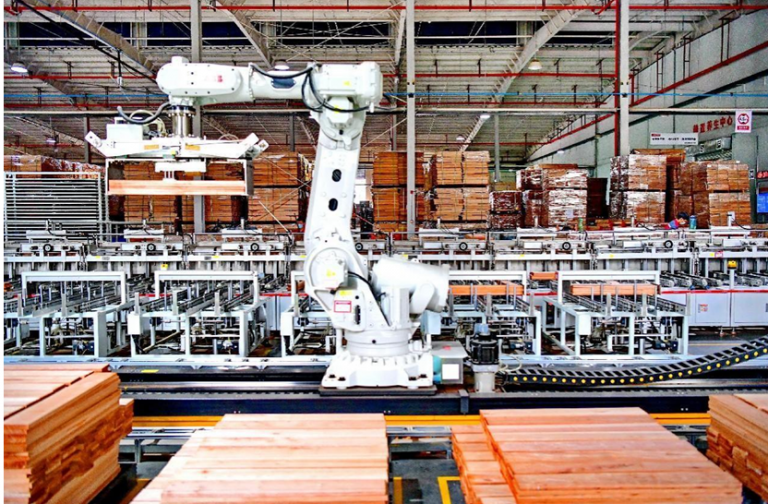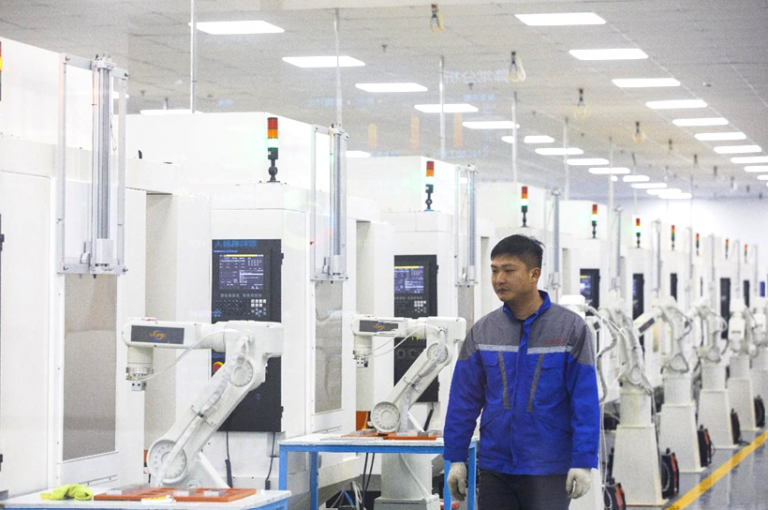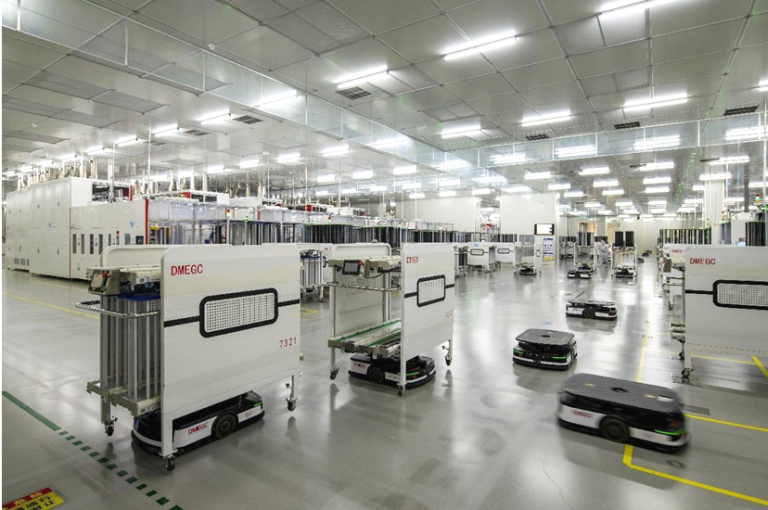
By Peng Xunwen
In factory workshops, robots are precisely producing parts; on roads, autopilot vehicles are running to accumulate data under different traffic scenarios; on industrial cloud platforms, enterprises trade with each other idle production capacity and equipment.
In today’s China, the industrial internet is promoting in-depth integration between the digital economy and the real economy, creating new prospects for industrial production.
In a pile driver factory of Chinese heavy equipment manufacturer Sany Group in Changping district, Beijing, there stood several machines that were dozens of meters high.
“These are rotary drilling rigs we manufactured. Each of them weighs nearly 100 tons and can drill to a depth of over 100 meters,” said Yin Yanhu, head of the factory’s production technique department.
These giant devices were manufactured in a huge workshop, where various robots controlled by a few workers were busy working in the production line. neatly arranged. Different from traditional laborers, these workers were more like “taking care” of the robots, ensuring that those smart machines functioned properly.
Yin told People’s Daily that machines were mostly manufactured by human labor in the past, and it took about a month to make a rotary drilling rig. At that time, there used to be over 1,000 workers in the factory, and the annual output was more than 3 billion yuan ($414 million).

A worker inspects an automated workshop in Yancheng, east China’s Jiangsu province. (Photo by Chai Junwei/People’s Daily Online)
“In 2019, the factory started the digital transformation. Now it takes only around a week to manufacture such a rotary drilling rig, and the annual output has jumped to more than 7 billion yuan,” Yin said, adding that hundreds of workers have become versatile and turned into engineers that can perform physical tasks and program.
The key to the factory’s digital upgrading lies in a system developed based on the industrial internet platform Rootcloud. Yin called it the central controlling system of the factory, a “brain” for manufacturing.
To manufacture a rotary drilling rig, for example, the system can rapidly assign required tasks to each flexible production line, work island, equipment and worker. The whole workflow is digitally driven, from order generation to delivery, Yin said.
In the factory, machine parts are welded, moved and assembled by robots. Rootcloud works nonstop to analyze the industrial data collected from over 36,000 sampling sites, so as to generate the optimal parameters for each procedure and machine model, and optimize the workflow to the maximum extent.
The factory was recognized by the World Economic Forum as a “lighthouse factory” in 2021.
According to statistics recently released at the 2023 Industrial Internet Conference, the scale of China’s industrial internet industry has exceeded 1.2 trillion yuan. Besides, 240 influential industrial internet platforms have been listed, including Rootcloud, serving more than 260,000 enterprises. Rootcloud is one of them.
Recently, Rootcloud unveiled three versions of its industrial internet operating system tailored for smart factories, digital enterprises and intelligent chains. As the core of the platform, the operating system, after seven years of application verification, is able to virtualize industrial equipment in an online space and provide a sound environment where enterprises develop and run their applications.

Automated guided vehicles are running in an intelligent factory in Jinhua, east China’s Zhejiang province. (Photo by Hu Xiaofei/People’s Daily Online)
At present, the operating system is providing industrial internet services for nearly 1,000 relevant enterprises.
Co-founder and CEO He Dongdong of Rootcloud said that data from traditional industrial information systems are distributed in a layered structure, and the transmission of data is completed in a bottom-up manner layer by layer.
However, he said, in digital factories built by the industrial internet operating system, data can be exchanged more frequently and efficiently, and the cost of developing industrial applications is lower.
On the industrial internet platform Laohuyun, or TigerCloud, authorized enterprises can not only check other enterprises’ data, but also make purchases, sell products, launch training sessions, and carry out maintenance activities. Just like a “social network” for industrial enterprises, the platform boasts annual transactions of tens of billions of yuan.
XCMG Hanyun, an industrial internet platform launched by Chinese heavy machinery manufacturing company XCMG, has been connected to more than 400,000 sets of equipment. It obtains data through instruments developed based on China’s BeiDou Navigation Satellite System. The platform currently provides services for tens of thousands of enterprises in some 80 industries.
Yu Xiaohui, head of the China Academy of Information and Communications Technology, told People’s Daily that China’s industrial internet is entering a new phase featuring large-scale development. Industrial internet will become an important approach and infrastructure leading the manufacturing industry toward more digitalized and higher-end development that is smarter and greener, Yu said.










